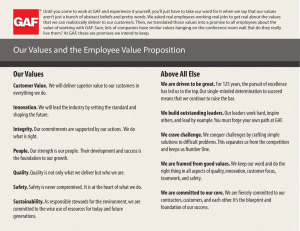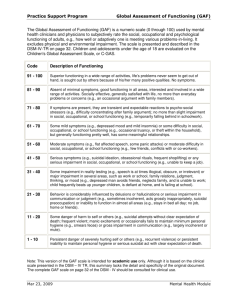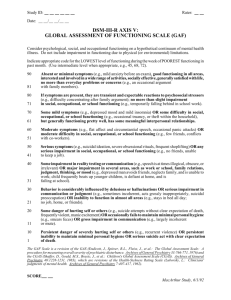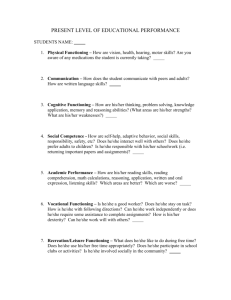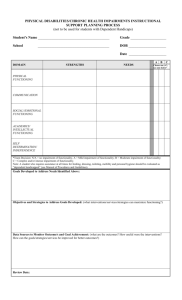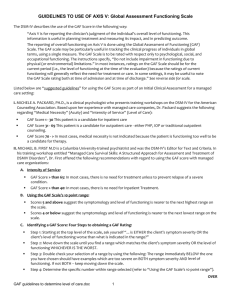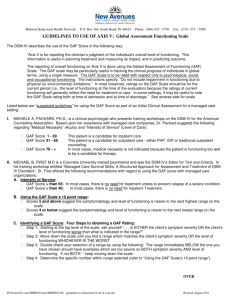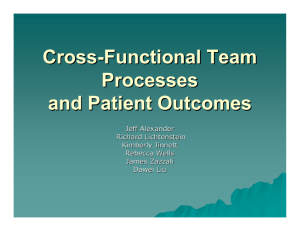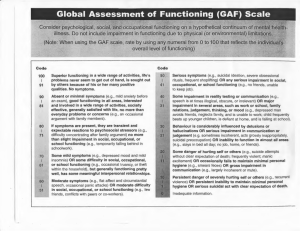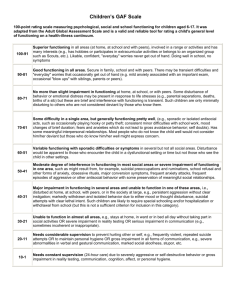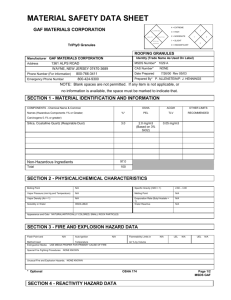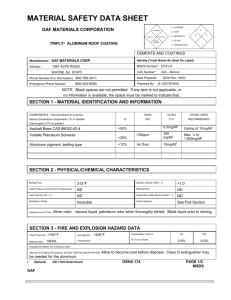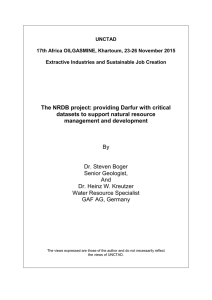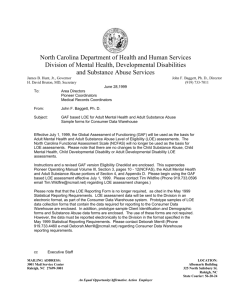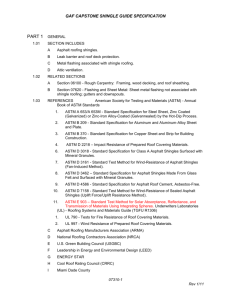Global Assessment of Functioning Scale• (GAF)
advertisement
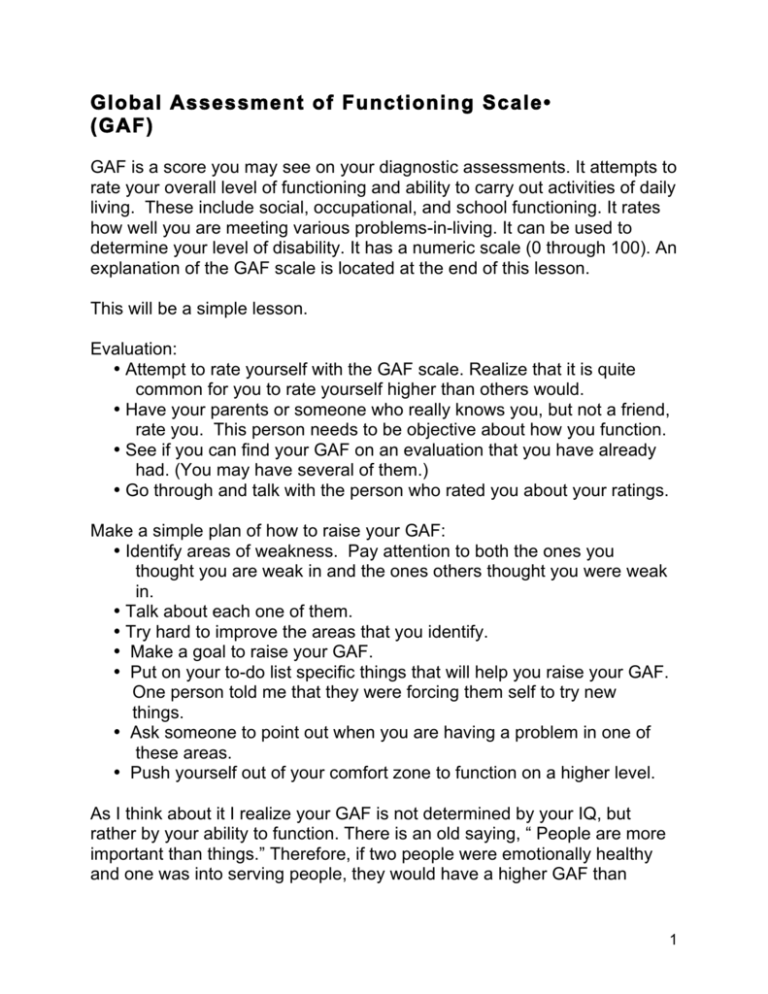
Global Assessment of Functioning Scale• (GAF) GAF is a score you may see on your diagnostic assessments. It attempts to rate your overall level of functioning and ability to carry out activities of daily living. These include social, occupational, and school functioning. It rates how well you are meeting various problems-in-living. It can be used to determine your level of disability. It has a numeric scale (0 through 100). An explanation of the GAF scale is located at the end of this lesson. This will be a simple lesson. Evaluation: • Attempt to rate yourself with the GAF scale. Realize that it is quite common for you to rate yourself higher than others would. • Have your parents or someone who really knows you, but not a friend, rate you. This person needs to be objective about how you function. • See if you can find your GAF on an evaluation that you have already had. (You may have several of them.) • Go through and talk with the person who rated you about your ratings. Make a simple plan of how to raise your GAF: • Identify areas of weakness. Pay attention to both the ones you thought you are weak in and the ones others thought you were weak in. • Talk about each one of them. • Try hard to improve the areas that you identify. • Make a goal to raise your GAF. • Put on your to-do list specific things that will help you raise your GAF. One person told me that they were forcing them self to try new things. • Ask someone to point out when you are having a problem in one of these areas. • Push yourself out of your comfort zone to function on a higher level. As I think about it I realize your GAF is not determined by your IQ, but rather by your ability to function. There is an old saying, “ People are more important than things.” Therefore, if two people were emotionally healthy and one was into serving people, they would have a higher GAF than 1 someone who is a brilliant, rich, isolated businessman. I realize this might be over simplified; however, read the teachings on, “Hanging Out Syndrome,” “Executive Functioning Skills,” and “Brain Health. Realize these all fit together. The higher your executive functioning skills and GAF, the less likely you will be to do alcohol or drugs. Along this same line of thinking, if you eat healthily you would have a higher GAF than someone who eats poorly. When reading through the GAF scale, realize that much of it has to do with your emotional and mental health. I realize that you cannot just snap your fingers and say, “Go away problems.” For some, medications help to either control or to alleviate the problem. I once studied a program that helped people with emotional and mental health problems. It was based on nutrition and actions. The program’s theory was that sugar affects your emotional and mental state. It taught that alcohol is extremely high in sugar, therefore affecting both your emotional and mental state. It required setting goals and moving towards them. It also had an interesting twist of telling people who wanted to become emotionally and mentally healthier that they needed to help others, serve people. We should all strive to raise our GAF. So, let’s make that a goal and work towards it. Let’s do the things which we know will help us function at a higher level. This includes being nice, helpful, striving to serve people, building healthy relationships, making wise food choices, and staying away from alcohol, drugs and people who use them. Global Assessment of Functioning (GAF) Scale• All of this information was pulled from the DSM IV-TR Consider psychological, social, and occupational functioning on a hypothetical continuum of mental health-illness. Do not include impairment in functioning due to physical (or environmental) limitations. 2 Code (Note: Use intermediate codes when appropriate, e.g., 45, 68, 72.) 100-91 Superior functioning in a wide range of activities, life’s problems never seem to get out of hand, is sought out by others because of his/her many positive qualities. No symptoms. 90-81 Absent of minimal symptoms (e.g., mild anxiety before an exam), good functioning in all areas, interested and involved in a wide range of activities, socially effective, generally satisfied with life, no more than everyday problems or concerns (e.g., an occasional argument with family members). 80-71 If symptoms are present, the are transient and expectable reactions to psycho-social stressors (e.g., difficulty concentrating after family argument); no more than slight impairment in social, occupational, or school functioning (e.g., temporarily falling behind in schoolwork). 70-61 Some mild symptoms (e.g., depressed mood and mild insomnia) OR some difficulty in social, occupational, or school functioning (e.g., occasional truancy, or theft within the household), but generally functioning pretty well, has some meaningful relationships. 60-51 Moderate symptoms (e.g., flat affect and circumstantial speech, occasional panic attacks) OR moderate difficulty in social, occupational, or school functioning (e.g., few friends, conflicts with peers or co-workers). 50-41 Serious symptoms (e.g., suicidal ideation, severe obsessive rituals, frequent shoplifting) OR any serious impairment in social, occupational, or school functioning (e.g., no friends, unable to keep a job). 40-31 Some impairment in reality testing or communication (e.g., speech is at times illogical, obscure, or irrelevant) OR major impairment in several areas, such as work or school, family relations, judgment, thinking, or mood (e.g., depressed man 3 avoids friends, neglects family, and is unable to work; child frequently beats up younger children, is defiant at home, and is failing at school). 30-21 Behavior is considerably influenced by delusions or hallucinations OR serious impairment in communication or judgment (e.g., sometimes incoherent, acts grossly inappropriately, suicidal preoccupation) OR inability to function in almost all areas (e.g., stays in bed all day; no job, home or friends). 20-11 Some danger of hurting self or others (e.g., suicidal attempts without clear expectation of death; frequent violent; manic excitement) OR occasionally fails to maintain minimal personal hygiene (e.g., smears feces) OR gross impairment in communication (e.g., largely incoherent or mute). 10-1 Persistent danger of severely hurting self or others (e.g., recurrent violence) OR persistent inability to maintain minimal personal hygiene OR serious suicidal act with clear expectation of death. Taken from: http://www.bsu.edu/csh/ssrc/media/pdf/gafpage.pdf 4
